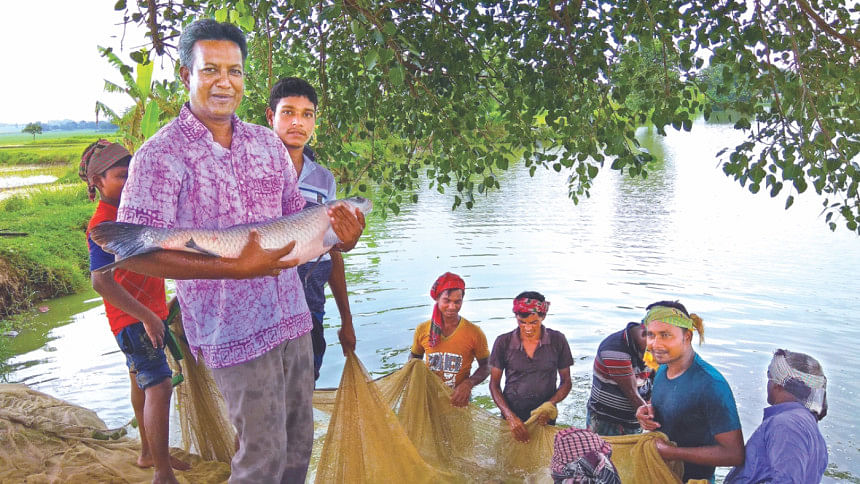One man’s venture to eat healthy

Life had offered Munjer Alam Manik, who used to work at a multinational company, almost all modern amenities in the crowded metropolis of Dhaka. Yet a thought nagged him all the time. “What are we eating,” he would mull frequently about the pervasiveness of adulterated and contaminated food in the capital’s grocery shops and markets.
“After my son’s birth, I became more concerned with food contamination. I wanted to do something about it,” said Munjer. And he did.
The 42-year-old was recounting the story of his success in organic fish farming when this correspondent visited Munjer’s 26-acre farmland at Dakkhin Sahar in Chapainawabganj Sadar upazila.
In 2014, Munjer invested Tk 85,000 and leased a pond starting an organic fish farm. Soon he expanded his business, investing a total of nine lakh taka in four leased ponds on 4.4 acres of land. Within three years, he was earning enough to quit his job in Dhaka and move his family to Chapainawabganj town. Today, the fish farm generates around Tk. 2.5 lakh profit each year.
“Our markets are full of pesticides laden vegetables. It has become a menace for people who cannot get organically farmed fish and vegetables,” said the organic food producer, who also planted papaya, banana, gourd, pumpkin and other vegetables in a planned manner on the banks of the ponds.
“I had just one agenda when I decided to farm organic fish. My aim was to make fresh fish and pesticide free vegetables available to everyone,” he said.
Munjer totally avoids chemical fertilisers, or feeds available in local markets for use in his ponds and vegetable plants.
He feeds the fish in his farm with natural food such as oil cake (residues from compressed oilseeds) and crushed maize.
Fish feeding on natural food grows slowly compared to ones that eat commercially manufactured feed, admits Munjer. However, he produces at a small scale only for the local market and charges a higher price per kg of fish for the quality.
“I paid him only Tk 20 to Tk 30 higher price per kg compared to market price, but I get fresher and better tasting fish than those available in the market,” said one of Munjer’s regular customers, Hasan al Sadi, a businessman of Basuniapatti in Chapainawabganj town.
About 80-90 people, mostly from Chapainawabganj town and villages adjacent to the farm, buys from Munjer.
“My buyers usually buy one week’s worth of fish,” he said adding that the quantity and frequency of netting the fish depend on customers’ order.
Buyers collect their orders directly from the farm; sometimes, Munjer supplies the fish to the buyers’ house on his own motorcycle.
Different species of carp including- rui, katla, mrigal, silver carp, grass carp, as well as tilapia and clown knife fish are available in the farm.
From dawn to dusk, Munjer supervises the work in his acreage, which also includes a dairy farm. Except for one helping hand, Munjer mostly employs temporary day labourers from the locality as farm hand. Each month around Tk 55,000 is spent behind the four ponds.
Referring to Munjer’s work, Dr Amimul Ehsan, district fisheries officer, said, “Our department highly appreciates him for his organic fish farming.” He hopes it will inspire other young men to take up organic fish farming too.

 For all latest news, follow The Daily Star's Google News channel.
For all latest news, follow The Daily Star's Google News channel. 



Comments